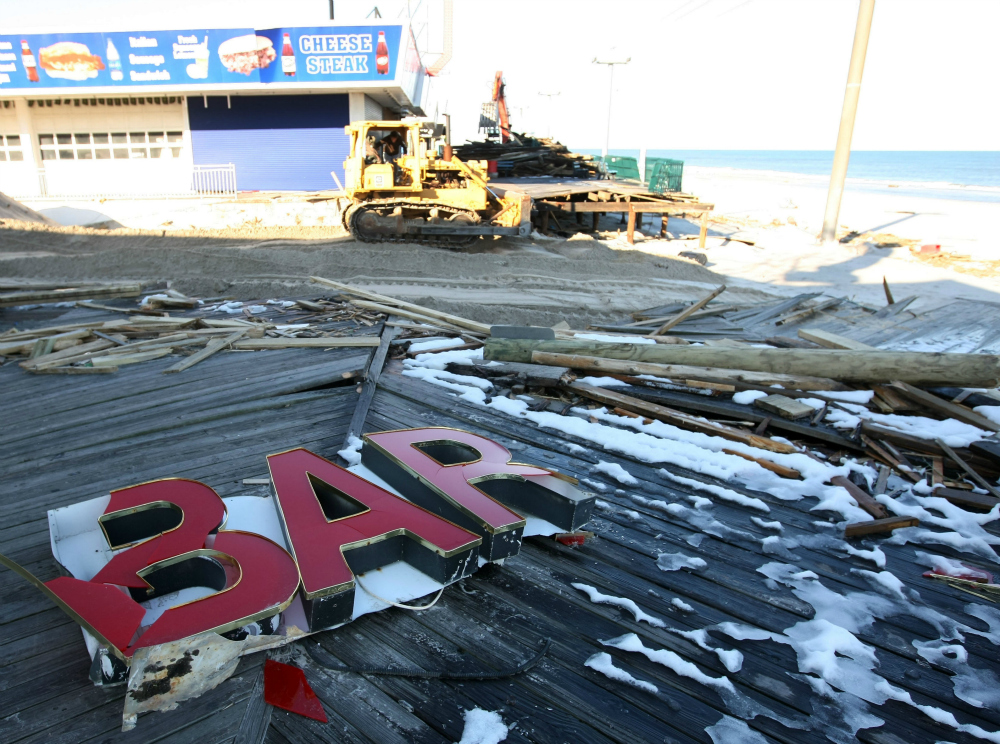Among small business owners in New York, New Jersey and Connecticut who were impacted by Superstorm Sandy, some 71 percent of them experienced power outage after Sandy, which led to temporary disruptions in business operations in many cases, according to a survey by The Hartford Financial Services Group.
The sample included 150 small business owners within the five boroughs of New York, 150 in New Jersey and 151 in Fairfield, New Haven and Middlesex counties of Connecticut. One respondent per business was conducted via telephone interviews between Jan. 3, 2013 and Feb. 13, 2013.
The survey also found that 74 percent of impacted owners had to close their doors for a period of time — and it took them an average of seven days to reopen. Some 56 percent of those polled said they had connectivity issues such as phone and Internet service post-Sandy.
And while only 11 percent experienced structural property damage, 52 percent experienced loss of sales or revenue as a result of Sandy.
“Our research shows that loss of connectivity had a big impact on small business owners, which affected their ability to contact customers and keep their businesses open,” said Ray Sprague, senior vice president of the small commercial insurance segment for The Hartford.
“We have found that small businesses who take the steps to prepare and protect the business, such as establishing emergency communication systems and backing up critical data, tend to be the ones that can prevail after weather emergencies,” he said.
Despite the notable effects of the storm, 87 percent said that they were equally or better prepared than other small businesses in their area, according to The Hartford’s survey.
The survey, which was fielded nearly three months after the storm struck the East Coast, also found that:
• Customer issues (65 percent), employee issues (47 percent) and supplier issues (44 percent) were challenges for impacted owners during or after the storm;
• One-third (36 percent) of small business owners impacted said that they were impacted significantly;
• More male small business owners (42 percent) reported that they were significantly impacted compared to female small business owners (28 percent);
• In addition, more impacted respondents had to close their businesses for a period of time in New York (81 percent) and New Jersey (78 percent), compared to Connecticut (64 percent); and
• Impacted small business owners in New Jersey were more likely to have experienced power outage (82 percent) than those in Connecticut and New York (71 percent and 62 percent respectively).
Storm Preparation
According to the survey, 25 percent prepared for Sandy by creating backup copies of critical data and programs, while 20 percent prepared an emergency kit with essentials (e.g., flashlights, water) and the same amount protected their buildings from the elements (e.g., boarded up a storefront).
Adjusting Business Strategies Post-Sandy
The survey showed that the consequences of the storm will continue to stretch beyond the immediate impact of a week-long closure. In order to recover from Sandy, small business owners who were financially impacted are taking action, including adjusting their business strategy (35 percent), cutting costs this year (32 percent), and scaling back or stopping hiring new employees (25 percent), the survey found.
Advice for Fellow Small Biz Owners
Based on their experience with Sandy, impacted respondents reported they would give the following advice to fellow small business owners:
• Review the company’s property insurance coverage (23 percent)
• Invest in a generator (21 percent)
• Create a backup of important records (15 percent)
• Develop a business continuity plan (14 percent)
“It’s important for small business owners to talk with their agents about the right insurance for their businesses and make sure they are prepared for weather emergencies,” The Hartford’s senior vice president Sprague added.
“This can include everything from reviewing your current insurance coverage and addressing new needs to developing a business continuity plan. For business success, it’s critical to prepare for the unexpected and protect the business and employees, in order to prevail in the months and years ahead.”
Was this article valuable?
Here are more articles you may enjoy.


 Michigan Supreme Court Rules Against Couple in Drone Surveillance Case
Michigan Supreme Court Rules Against Couple in Drone Surveillance Case  Fannie and Freddie Hit Pause on Replacement-Value Requirements for Home Insurance
Fannie and Freddie Hit Pause on Replacement-Value Requirements for Home Insurance  Insurer Chubb Readies $350M Payout Tied to Baltimore Bridge Collapse
Insurer Chubb Readies $350M Payout Tied to Baltimore Bridge Collapse  The Top 15 U.S. Metros with High Exposure to Wildfire Risk
The Top 15 U.S. Metros with High Exposure to Wildfire Risk 

